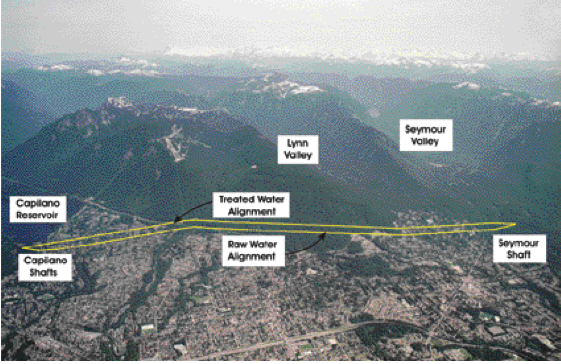Vancouver's twin tunnels about 75% complete
May 2010
Erika Hinze, Freelance Journalist
- It has been almost a year now since work on the Seymour-Capilano twin tunnels in Vancouver, B.C. resumed. The tunnels, which are being driven 160m–640m below ground level, are a component of the Seymour Capilano Filtration Project, which will serve to improve the quality of the region’s drinking water. Boring came to a standstill in 2008 amidst safety concerns raised by the contractor at the time -- Bilfinger Berger Canada. BBC pulled the plug on the work in January of that year and a few months later Metro Vancouver, the regional utilities provider, terminated the contract altogether.
-

Alignment of the 7.1km long twin water conveyance tunnels
- Since then, a completion contract has been awarded to the Seymour-Cap Partnership (a JV of Frontier-Kemper, J.F. Shea and Aecon) for a fixed price of $181 million. Having picked up where the terminated BBC contract left off, the two Robbins rock TBMs on the two 7.1km, 3.8m diameter tunnels are moving along at a steady pace.
- Excavation of the raw water tunnel, which will carry untreated water from the Capilano watershed and reservoir to the newly opened Seymour-Capilano Water Filtration Plant, is just more than three quarters complete. Bill Morrell, spokesman for Metro Vancouver, said the TBM has now reached the 5.9km mark. "[The heading] has advanced about 1.75km since work resumed last August. In the last two or three weeks progress has averaged about 15m a day, which I think is very good progress," he said in an interview in mid April.
- Work on the feeder tunnel, which will carry treated water back to the Capilano area for distribution, resumed last July and has advanced 1.9km since then. Morrell said the TBM has reached the 5.7km mark; about 200m behind its counterpart in the twin tunnel. He said the work has been hindered by varying ground conditions including some soft rock which had slowed progress in the feeder tunnel. However, he said the feature was not a surprise and was included in the geotechnical baseline report.
- The new contractor continues to use the original Robbins hardrock TBMs that BBC started the work with. But, Morrell said there have been some minor modifications to the machines including changes to the trailing gear so they could pass through the steel supports installed as per the contract. The finger shields were also replaced on one of the machines.
- He said the original tunnel support protocols are still in place and range from no support at all, to spot bolts, pattern bolts with mesh, and steel sets with mesh. Support elements were among Bilfinger Berger's safety concerns. In a 2009 interview, the contractor told TunnelTalk that the steel ribs, rockbolts and welded wire mesh support elements, as specified in the contract, were "not sufficient, safe or viable in the changed conditions" they encountered during the drives.
-

One of a pair of Robbins rock TBMs on the project
- Morrell said the horizontal tunneling work should be complete by this fall. Once that is done, the raise bore process will begin and should take about nine months. The vertical shafts and ends of the tunnels will also be lined with steel. Installation of the steel lining is scheduled to begin next year and progress into 2012.
- The water tunnels come at a cost of about $400 million, a price that has doubled since 2004. Morrell explained however that the total includes more than just the tunnel boring process. He said it encompasses costs like the initial engineering and detail design work. He also said inflation has played a role. But, he says Metro Vancouver is suing Bilfinger Berger to recover the additional costs of completing the tunnels and believes the case goes to court in the fall of 2011.
- Bilfinger Berger has also filed a suit against Metro Vancouver in attempts to recover funds lost as a result of the termination of contract.
- Morrell said water should be flowing through the tunnels by early 2013.
- "We have a very strong working relationship with the Seymour-Capilano Partnership. At 15m a day, I think that is showing that they are doing a very good job and we are very satisfied with that. We are confident that this work is continuing well and we can meet our current completion schedule."
- Vancouver's twin tunnels contract terminated - TunnelTalk, May 2008
Twin tunnel restart comes at a high price - TunnelTalk, April 2009
|
|
|
|
|
Add your comment
- Thank you for taking the time to share your thoughts and comments. You share in the wider tunnelling community, so please keep your comments smart and civil. Don't attack other readers personally, and keep your language professional.


